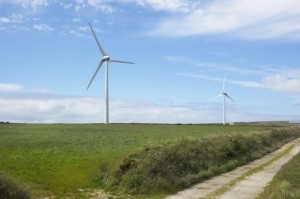Good Energy, the Chippenham-based renewable energy company, has unveiled plans for a community-owned wind farm which could become the first in the UK to operate without government subsidy.
The Government last year announced an end to subsidies for onshore wind farms in Britain.
As a result, Good Energy plans to fund its Big Field Wind Farm in Cornwall solely by income from the electricity it generates. 
The company also plans to open up the project near Bude to investment from local people, making it potentially the largest community-owned wind farm in England.
Good Energy CEO and founder Juliet Davenport said: “This is a bold and innovative response to the challenges laid down by Government to the renewables industry since the election last year.
“This project will give local people the chance to show their support for renewable energy, and all the benefits it brings both locally and globally, by investing in their own wind farm.”
Bill Andrews, one of local residents living closest to the wind farm site, said: “This is a very welcome development. A lot of my neighbours already support this wind farm and giving local people the chance to invest in the project would mean the community will see even more of the benefit.”
Shortly after last May’s General Election, the Government announced it would end subsidies for onshore wind farms from this April – a year earlier than previously proposed. Energy Secretary Amber Rudd said new onshore wind farms could still be built in the UK, but only on a zero-subsidy basis.
The Government also introduced new planning rules to ensure wind turbine proposals would only get the go-ahead if they had the clear backing of the local community.
Following a review of the proposals it first put before local planners in 2014, Good Energy unveiled a revised design for the Big Field Wind Farm which could boost its energy output by up to 50% without increasing the maximum height of the turbines.
As a result, the company says the 11 turbines could generate enough power for more than 22,000 homes and pay back the costs of development and construction without the need for subsidy.
Alongside the new project design, Good Energy has announced proposals to enable the wind farm to become majority-owned by a range of local investors. These could include local residents, community groups and other local organisations.
These proposals were published this week as part of the information Good Energy is submitting to the Planning Inspectorate ahead of an inquiry scheduled to begin next month.
Juliet Davenport added: “The benefits of the Big Field Wind Farm are too great for it not to go ahead just because subsidies are being withdrawn.
“We have listened carefully over the past 18 months to everything we’ve been told about the project, and to the wider debate around government support for renewables. As a result, we’ve come up with innovative new proposals using the latest, most efficient turbine designs that will deliver a greater power output from the wind farm with minimal additional impact.
“Being community-owned will ensure that the economic benefit of the wind farm can be retained locally and re-invested in Cornwall.”
Good Energy’s original proposal for The Big Field Wind Farm was for 11 turbines with a maximum tip height of 125 metres and total installed capacity of between 22MW and 27.5MW.
The new design features the same number of turbines with the same maximum tip height but longer blades and a lower hub height, potentially increasing the total installed capacity of the wind farm to 38.5MW.
The revised estimate of homes powered is based on an installed capacity of 38.5MW and a forecast of the annual power output of the wind farm using wind data collected on the site.
Good Energy’s original proposal for the Big Field Wind Farm was refused planning permission by Cornwall Council in October 2014. The company is currently appealing that decision.
The planning application in 2014 included outline proposals for a community investment scheme consisting of a bond offer to local residents. Following feedback from local community groups, the company is developing ways for local investors to own a majority equity stake in the wind farm. If the project is approved, the community investment proposals would be written into a legal agreement as part of the planning consent.
Separate to the investment proposal, Good Energy is proposing a package of community benefits worth at least £5,000 per MW of installed capacity annually for the life of the project. Subject to local demand, this could include the offer of local tariff offering renewable electricity at 20% less than Good Energy’s standard prices to homes within 5km of the wind farm.
Pictured: Good Energy’s Delabole wind turbines in Cornwall


















